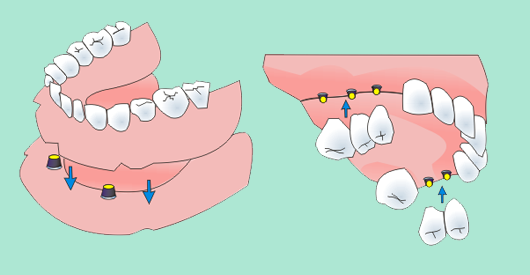IMPLANTS
| Missing
tooth |
|
Inserting
Implant |
|
Healing
Screw |
|
Insering
Crown |
| Should
be free from infection |
|
Healing
time3-6 months |
|
Should
heal 2 weeks |
|
|
Dental implants are tiny titanium cylinders which are permanently
implanted into the jawbone to replace roots of single or multiple
missing teeth. These anchors act as tooth root substitutes. After
a period of time the bone bonds with titanium, creating a strong
foundation for artificial teeth bonds. Small posts are then attached
to the implants which protrude through the gums. These posts provide
stable anchors for natural-looking replacement teeth.

Dental
implants can also be used to help stabilize or support dental bridge
or removable dentures. In all cases, dental implants result in a
significant improvement in your quality of life. They look, feel
and function like natural teeth. When used in conjunction with modern
restorative dentistry, their appearance, comfort and function are
very likely to exceed your expectations.
Implantation
surgery is done with the local anaesthesia which makes it totally
painless and last up to an hour. Having on offer a full range of
Implant Systems available on the market we are able to find a solution
to each and every complex case.
Treatment plan involving dental implants is preceded by a
consultation to give precise diagnosing. The plan is unique for
each individual and accordingly the timing, cost and delivery of
care will be customized to suit personal needs.
Dentists
always strive to save every tooth possible before its extraction.
A healthy restored tooth is far better than an artificial one. Even
the most broken and badly decayed teeth can be built up again.
The Benefits of Dental Implants:
Solution
for Life - Dental implants offer a long lasting solution. Normally,
it serves its owner for life.
Preserve Healthy Teeth - Implants can stand on their own.
They do not require the assistance of your natural teeth for support.
Partial dentures and fixed bridges require some degree of 'preparation'
of the adjacent natural teeth. As mentioned above, the latter can
involve grinding your teeth down to little pegs in order to attach
the bridge. Even this may not ensure stability if the supporting
teeth are loose or weak.
Preserve
Bone - Healthy implants can preserve bone just like your own
healthy natural teeth. No other option offers this. In fact, wearing
dentures can accelerate bone loss, making the dentures less stable
and more uncomfortable over time.
Preserve
Facial Looks - When you loose the entire tooth crown and root
shrinkage of the jaw bone may cause your face to look older. Dental
implants can stop this process.
Improve
Comfort - Implants can be more comfortable than full or partial
dentures. Dentures are supported either by soft gum tissues that
cover the jawbones and/or by teeth. Over time, these structures
can change and teeth can become loose, resulting in pain and discomfort.
These unfortunate side effects are avoided with implants since they
do not rely on the jawbones/teeth for support.
Improve
Speech - Unlike implants dentures shift inside your mouth causing
mumbles, slurred speech and clicking noises. These problems can
be eliminated with implants. Implant-supported replacement can securely
anchor loose dentures that impede speech and enable you to speak
with comfort and confidence.
Improve
the Ability to Eat - Every denture wearer has to learn how to
eat with dentures. They are never like your own teeth. Typical denture
patients with excellent fitting dentures eat at 15 to 20 percent
of the efficiency of people with natural teeth. Some people never
get used to the discomfort and loss of taste and function associated
with them. Implants, on the other hand, can restore your chewing
efficiency to that of your natural teeth, since they are anchored
to your jawbone. Implants can also improve taste by allowing you
to have a full upper denture without covering your palate.
Improve
Aesthetics - Implants can eliminate the need for the unsightly
clasps that come with partial dentures. And since they don not rely
on the adjacent teeth for support, they may eliminate the need for
additional crowns, which sometimes have the side effect of damaging
the appearance of your natural tooth.
Improve
Quality of Life - Implants can eliminate the need for messy
denture adhesives, special time-consuming oral hygiene techniques
to clean around bridges, and other embarrassing inconveniences that
come with dentures. Furthermore, considering all of the above benefits,
implants can improve your self-esteem. By allowing you to regain
the capabilities of your natural teeth, you can focus on enjoying
life.
Keep
Teeth Separate - Ideal implant placement allows treatment to
be isolated to individual teeth. When one tooth of a bridge needs
treatment, usually the whole bridge needs replacement. But now that
implants are available, adjacent teeth do not need to be treated.
Reduce
Long-Term Costs - With all of the benefits mentioned so far,
the higher initial cost of implants and their restorations is usually
offset in the long term by their high success rates, low maintenance,
ability to keep treatment isolated to specific areas, and high patient
satisfaction.
|



